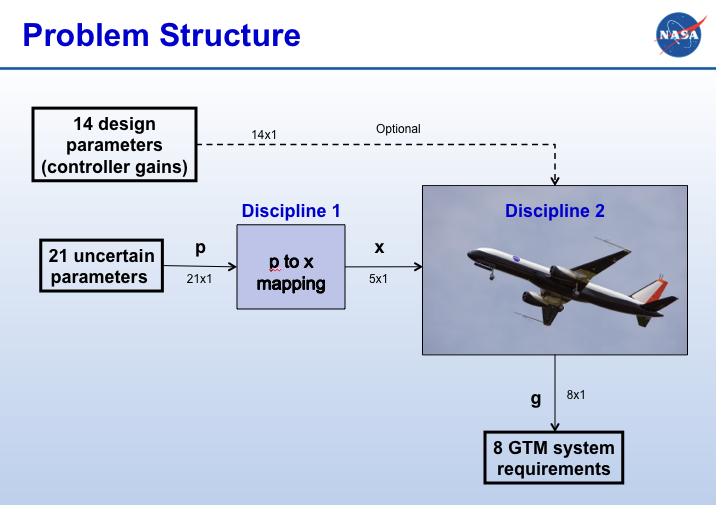This page is dedicated to the dissemination of information related to The NASA Langley Multidisciplinary Uncertainty Quantification Challenge
NASA missions often involve the development of new vehicles and systems that must be designed to operate in harsh domains with a wide array of operating conditions. These missions involve high-consequence and safety-critical systems for which quantitative data is either very sparse or prohibitively expensive to collect. Limited heritage data may exist, but is also usually sparse and may not be directly applicable to the system of interest, making uncertainty quantification extremely challenging. NASA modeling and simulation standards require estimates of uncertainty and descriptions of any processes used to obtain these estimates. To better meet this standard, NASA is seeking responses to this challenge problem to address the following:
- Modeling and refinement of uncertainty given sparse data
- Propagation of mixed aleatory and epistemic uncertainties through system models
- Parameter ranking and sensitivity analysis in the presence of uncertainty
- Identification of the parameters whose uncertainty is the most/least consequential
- Worst-case system performance assessment
- Design in the presence of uncertainty
NASA LaRC Multidisciplinary Uncertainty Quantification Challenge
- Detailed problem formulation is available in the document: The NASA Langley Multidisciplinary
Uncertainty Quantification Challenge. - Interested parties are invited to submit a full paper for consideration in a special session of the 16th AIAA Non-Deterministic Approaches Conference, 13-17 January 2014, National Harbor, Maryland. (SciTech 2014)
- Extended abstracts are due: June 5, 2013. In the abstract of your submission, please identify the title of the special session, NASA Langley Multidisciplinary Uncertainty Quantification Challenge.
- Important: Please inform us of your submission using the Contact Us page by including the paper’s title, the names of all the authors, and the paper’s control ID number. Choose “invited technical paper” as presentation type.
Objectives of the NASA Langley Multidisciplinary UQ Challenge
- Uncertainty Characterization:
- Advance methods for the refinement of uncertainty models using limited experimental data.
-
Refine uncertainty models given the following:
-
A mapping from parameters to output
-
Limited “truth data”
- An initial representation of the uncertainty model
-
- The classes of uncertainty models considered are:
- Aleatory uncertainties modeled as random variables with a fixed functional forms and known coefficients.
- Epistemic uncertainties modeled as fixed but unknown constants within prescribed intervals.
- Aleatory uncertainties modeled as a distributional probability boxes, with their parameters modeled as intervals.
- Sensitivity Analysis:
- Develop methods for the identification of critical parameters from within a multidimensional parameter space. This objective is similar to classical sensitivity analysis, but here metrics of interest are probabilistic and uncertain parameters belong to diverse classes of uncertainty models.
-
This will be an interactive process where challenge problem respondents interact with NASA sponsors to obtain unique model updates based upon their findings.
- We consider this as an open problem with great practical significance
- Uncertainty Propagation:
-
Deploy approaches for propagating uncertainties in multidisciplinary systems subject to both aleatory and epistemic uncertainty. This will involve the computation of ranges of both failure probabilities as well as of expected values.
-
This objective exploits the fact that very few tools exist to propagate mixed aleatory and epistemic uncertainties through general nonlinear systems. Their applicability and practicality remain to be demonstrated
-
- Extreme Case Analysis:
-
Identify the combination of uncertainties that lead to best- and worst-case outcomes according to two probabilistic measures of interest.
-
- Robust Design:
- Determine design points that provide optimal worst-case probabilistic performance. This objective is added as an optional element.
UQ Challenge Physical System
-
This challenge problem is based upon a model of the NASA Langley Generic Transport Model (GTM), see ref1 and ref2. The GTM is a 5.5% dynamically scaled, remotely piloted, twin-turbine, research aircraft used to conduct experiments for the NASA Aviation Safety Program. Although a discipline-specific application is the focus of this challenge problem, the problem was specifically structured so that specialized aircraft knowledge is not required. We seek responses from all interested parties – not only those with aircraft experience.
-
Eight stability and performance requirements are imposed upon the system. These requirements are representative of conventional measure of goodness typically used in aircraft stability and control, e.g., lateral & longitudinal stability, good command tracking, actuator saturation, etc.

Update: October 2017
The NASA Langley UQ Challenge presented at the ASME V&V Symposium, May 16-20, 2016